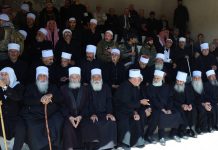London Bridge Attacker Usman Khan murdered two people and injured many in the London Bridge attack on Friday. In 2012, Khan became a convicted terrorist for his role in the Stock Exchange plan, while he schemed to attack the US embassy and the home of PM Boris Johnson, who was then the Mayor of London.
Are Drugs, Money and Religion Driving Stone Pelting in Kashmir?
At the time of his sentencing, the judge warned that Usman Khan was a “serious jihadist” who should not be released while he remained a threat to the public.
Indian netizens mercilessly trolled Pakistan for being a terror hub while Pakistani netizens defended the country by blaming the UK – as Usman Khan is a British citizen and born and bred in the UK. Khan was born in Stoke-on-Trent to working-class immigrant parents from Pakistan-administered Kashmir.
It became evident during the trial at Woolwich Crown Court that Usman Khan had no direct connection with Pakistan or Pakistan-administered Kashmir, birthplace of his parents. The trial heard from the counter-terrorism police experts that while Usman Khan discussed setting up a training camp for training in Pakistan-administered Kashmir but that project never saw light.
Pakistan PM Imran Khan Reacts Furiously To ‘Israeli Model For Kashmir’ Comment By Indian Diplomat
Countering Indian propaganda against Pakistan, some netizens have asked India to take responsibility for Usman Khan as his parents were from Pakistan-administered Kashmir – a region that New Delhi claims as an integral part of India. After the withdrawal of article 370 from Jammu and Kashmir, Indian people and even army officials have demanded to merge the region with J&K which had legally acceded to India.
As per the Indian claims on the region, Usman Khan has more Indian connections than Pakistan. If you claim the land, you must also take responsibility of its inhabitants and their actions, said a netizen.
Usman Khan was inspired by the terrorist ideology of terror group Al Qaeda but his source of inspiration was online grooming, local radical groups and widespread availability of extremist literature online and in social circles. The terrorism trial also gave a clear hint of Usman Khan’s own mental instability and disorder.
Indian Navy To Amplify Its Fleet Orientation To Maintain Supremacy In The Indian Ocean
Usman Khan was part of a gang of nine extremists from Stoke-on-Trent, Cardiff and London who were sentenced in February 2012 at Woolwich Crown Court. He was 19 at the time and youngest of the group. Most of the gang members were British Bangladeshis and three of them were born in Bangladesh while all the rest were British born.
Khan went to a local Stoke school and dropped out without any qualifications. Coming from a deprived and socially banished background, Usman Khan started hanging around with local street gangs and drug pushers in the area.
He lived for a large part of his life on Persia Walk. As he grew up, he started mixing with religious radicals. He was often seen doing stalls of “dahwa” in Stoke for the banned terrorist organisation al-Muhajiroun, which was once led by solicitor-turned-hate preacher Anjem Chowdhury.
Pakistan PM Imran Khan Reacts Furiously To ‘Israeli Model For Kashmir’ Comment By Indian Diplomat
Usman Khan and his colleagues were tapped from early 2010 by the British intelligence and counter-terrorism force but found no evidence whatsoever that Khan and his associates had any links to a foreign soil.
All of the gang members had admitted the charges of planning for acts of terrorism. The gang, led by Bangladeshi extremists, talked to each other through dawah – proselytising – or by Paltalk or other internet messaging. The London-based Bangladeshi gang members visited London Stock Exchange, Whitehall, American embassy and other locations for surveillance while preparing acts of terrorism. They were being secretly filmed while visiting the potential terror sites.
In the secret recording brought before the court, it was established that Usman Khan and others had planned to establish a “terrorist military training facility” on land owned by his family in Kashmir using their monthly income they received from the state.
In his sentencing remarks, Mr Justice Wilkie had said that Usman Khan and two others (Nazam Hussain and Mohammad Shahjahan) were “more serious” than the others. The court had heard that Usman Khan, Hussain and Shahjahan were planning to fund and establish the terrorist training school and for that purpose, they were planning to leave the UK in January 2011.
DRDO Equips Indian Tanks With Enhanced Night Vision Amid Tensions With Pakistan
The court heard that there was in camp in Pakistan-administered-Kashmir and the UK militants were planning to reach there and set it up. The court didn’t see any evidence linking anyone from Pakistan or Pakistan-administered-Kashmir for being in touch with the militants to help them in their aims of carrying out terrorist acts. When the group were arrested, they were found in possession of the Al-Qaida English-language extremist magazine, Inspire.
The detectives had planted bugs at Khan’s home in Persia Walk, Stoke-on-Trent. He was tapped discussing how he will gather funds using jobseeker’s allowance. Sentencing, the judge said that the gang embarked on a “serious, long-term venture in terrorism” that could also have resulted in atrocities in Britain.
Afghans Unhappy With Movie Panipat Over Vilifying Ahmad Shah Abdali
The judge had warned that Khan was a dangerous militant who should not be released while he remained a threat to the public. But that Khan, 28, from Staffordshire, had been released from prison with an electronic tag.
Khan was wearing a fake suicide vest and electronic tag when he attended the Learning Together criminal justice conference at Fishmongers’ Hall on London Bridge. He was permitted with other convicted prisoners to attend the program for rehabilitation of prisoners and convicts.




